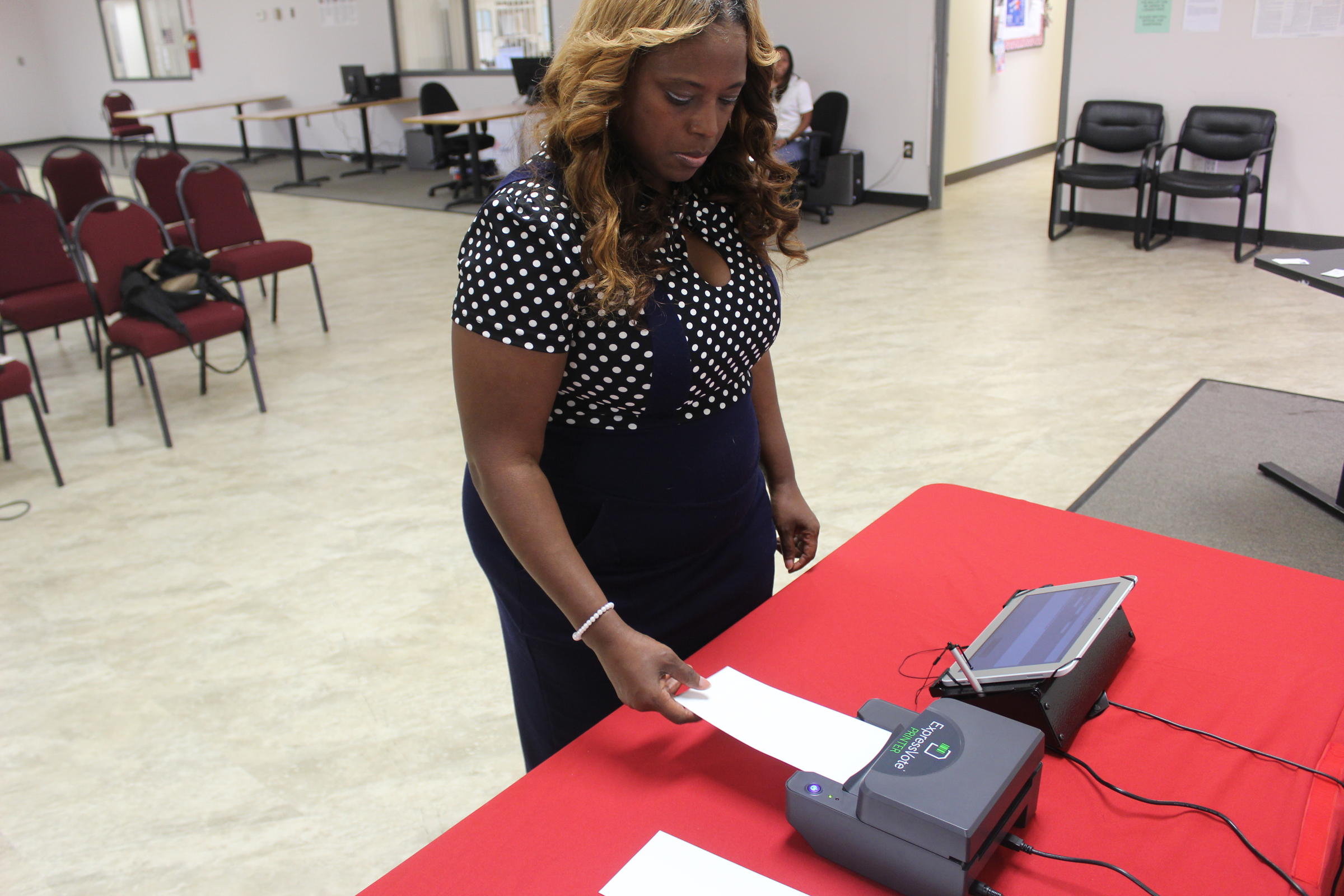Ga. Lawmakers Look Into New Voting Machines, But Cost Is Big Unknown

Johnny Kauffman / WABE
A bipartisan panel of Georgia lawmakers showed interest last week in a major overhaul of the state’s election systems.
But what may have been the first public indication in over a decade of significant support for the change showed signs of a likely debate over the cost to replace Georgia’s electronic-only voting machines, which were first purchased in 2002 and are being phased out around the country.
Georgia is one of only five states that still uses voting machines with no paper trail, going against the recommendation of cybersecurity experts.
If one part of a voting system is compromised or even just questioned, paper can be a backup for audits and recounts. The Georgia Secretary of State’s office — along with local election officials in Rockdale County — is testing voting machines that use paper in upcoming municipal elections.
The trial of those machines has been provided at no cost by Nebraska-based Elections Systems and Software. The system being tested uses a touchscreen computer that prints a voter’s selection on a paper ballot. Once the voter verifies that his selections are accurate, the voter drops the ballot in a secure ballot box, which scans a barcode printed on the same paper.
These types of voting machines are often called “ballot marking devices” or BMDs. They differ from a system where voters use pencils to complete a ballot, later depositing it in an optical scanner. Georgia’s current system uses a touchscreen computer and plastic cards.
At last week’s hearing, Chris Harvey, elections director in the Secretary of State’s office, told lawmakers implementing the BMD system Georgia is testing would cost more than an estimated $100 million.
“I don’t know exactly,” Harvey said of the cost.
Republican state Rep. Scot Turner of Holly Springs bristled at the estimate from Harvey. Turner has said it’s urgent the state update its voting system. He’s already filed legislation on the issue along with Democratic state Rep. Scott Holcomb.
“Let’s not throw numbers around when we don’t have a basis for how we got to the $100 million,” Turner said. “Let’s try to hold down the hyperbole through this. We don’t know what the cost is going to be until we have an RFP [request for proposals] and RFQ [request for quotation], and go through that process.”
The Secretary of State’s office later explained Harvey’s estimate is based on the $50 million Georgia paid in 2002 for its current system, adjusted for inflation, with potential training costs tacked on.
“He was reticent to share a number,” Republican state Rep. Ed Setzler said of Harvey’s estimate. “I think this committee is well-served to know that it’s not $5 million, or $20 million, or a billion, it’s sort in the $100 to $200 million – somewhere in that order of magnitude.”
Turner said he worries the cost estimate may scare off some of his colleagues in the Legislature who would likely need to approve the funds. But Turner reiterated what he sees as an urgent need to update the system.
“There are a lot of us that believe security of elections is worth a price tag that might seem like an eye-popping number,” he said. “We cannot afford to have an election where people are questioning whether or not the results were accurate.”
Hard To Determine Cost
Elections Systems and Software said each of its BMD voting machines costs about $3,500, and the associated ballot box, about $4,500.
There are 27,000 voting machines in Georgia, according to Harvey. That puts the cost of replacing them with the new system being tested at about $95 million, but would not account for additional equipment, costs and fees.
However, predicting the cost of new elections equipment is especially difficult, cautioned Larry Norden, deputy director of the Democracy Program at the Brennan Center for Justice.
Vendors are often the only entity that can fix, replace or update equipment, Norden said.
“It’s not like you can go to Staples and find any computer printer or screen that might be compatible with what you have at home,” he said. “It creates a more expensive market for elections officials.”
Complicating the discussion of cost is how it’s divided between jurisdictions. Unless the federal government provides funding, the cost is likely to be split between the state and Georgia counties, where in some rural areas budgets haven’t fully recovered since the recession.
Georgia’s Secretary of State’s office has not publicly announced any tests of additional voting systems that may have different costs than the current BMD trial. One popular system, in which voters use pencils to complete paper ballots that are then scanned, would require purchasing less equipment.
9(MDAxODM0MDY4MDEyMTY4NDA3MzI3YjkzMw004))








